Do your teams have psychological safety?
What makes the best teams flourish with engaged, productive colleagues? What accounts for the fact that other teams may have highly skilled, smart individuals but they cannot bring about meaningful team-driven results? Psychological safety was coined by Harvard researcher Amy Edmondson and propelled into the spotlight by a Google study. The concept of psychological safety is now regarded as a key element in high-performing, high-engaged teams.
The backstory: Google wanted to understand why some of their teams were thriving, while others weren’t. They undertook a multi-year study of 180 teams and their behaviors, and what they found was that the most critical element was “psychological safety.” Other research supports this idea.
Amy Edmondson, professor of leadership and management at Harvard Business School and the most prominent academic researcher in this field, defines psychological safety as “the shared belief among team members that the team is safe for interpersonal risk-taking” and explains that “team psychological safety involves but goes beyond interpersonal trust; it describes a team climate characterized by interpersonal trust and mutual respect in which people are comfortable being themselves”. In the simplest of terms, you feel psychologically safe in your team if you feel at ease with admitting to a mistake, pointing out a mistake made by a team member, speaking about work-related matters without censoring yourself and trying out new things.
For psychological safety to flourish, all employees must be accepted for who they are and valued for what they can bring. In fact, psychological safety is closely tied to diversity and inclusion, another reason why it has become such a buzzword today.
The fact that teams would value diverse views and new ideas may seem like an obvious assumption. However, research shows that, even in the most diversity-inclined organizations, often the most vocal or more senior voice sways decision-making, particularly when the workday is characterized by fast-pace, execution-focused agendas.
In fact, psychological safety usually must be built-into the culture of an organization in order for it to flourish. There is good reason to: studies show that when organizations promote an inclusive, open culture, employees are more likely to pitch innovative ideas that drive the organization forward. Those employees are also more likely to grow themselves – psychological safety includes strong feedback mechanism which encourages risk-taking and also provides ample discussion of ways to improve going forward.
Wondering about the level of psychological safety on your team? Take the mini-quiz below.
Mini-Assessment: Psychological Safety
Rate your team on a scale of one (strongly disagree) to five (strongly agree) for the following:
If I make a mistake, it is often held against me.
It is difficult to ask other members of this team for help.
Members of my team are able to bring up feedback, problems and tough issues.
I can take risks on this team.
Working with members of this team, my unique skills and talents are appreciated.
Scoring:
A. Sum of questions 3, 4 & 5 = .
B. Sum of questions 1 & 2 =
A minus B = Your score
Results:
A score below 8 your team may need to improve psychological safety;a score of 7-11 means your team has some psychological safety but could increase it, and a score of more than 11 means your team has a good amount of psychological safety.
